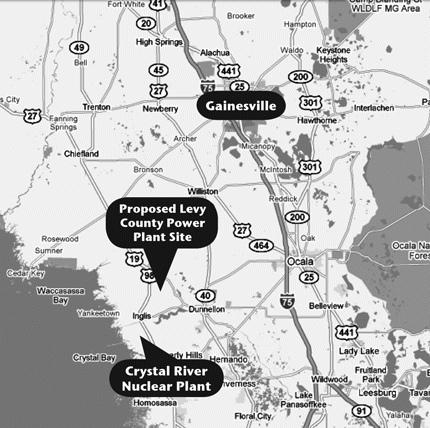Roughly five miles away from where the Withlacoochie River and Barge Canal kiss in southern Levy County lies a 5,100-acre stretch that illustrates the natural marriage of land and sky.
No steel beam, brick or piece of plywood spoils the earth. There, only imagination and curiosity stand guard.
But something big has been building for the past few years on the barren lands-controversy.
Since 2006, legislators and interest groups have jousted over a $17 billion Progress Energy Florida nuclear plant in Levy County and whether such an undertaking is necessary, cost-efficient and conducive to the well-being of the environment. In August of 2009, Gov. Charlie Crist approved the site plan.
Depending on who is speaking, the plant, which will be located about eight miles from PEF's Crystal River 3 Nuclear Power Plant, will either act as an energy savior or a ticking time bomb for the environment and taxpayers.
Supporters argue that it will meet the energy needs for a state which, according to PEF statistics, has seen a 30 percent increase in energy needs over the past 30 years.
PEF spokeswoman Suzanne Grant said the benefits for the plant are numerous. It will provide energy for 35 counties, reduce carbon emissions by more than 5 million tons a year and will potentially save customers $1 billion in annual fuel costs.
The plant, she said, will also inject an array of jobs into the local community. Currently, PEF projects 3,000 jobs for project construction, 800 for full-time jobs and 1,200 for indirect jobs.
Grant insists costs will not fall on customers until the new plant's two reactors are in service. Instead, she said, investors and capital raised through campaigns will finance the plant.
Chelsea Carnes, a member of Sustainable Urban and Rural Florida, is focused not on the financial side but rather the plant's effect on the environment.
Pointing to the potential collection of nuclear waste and biohazards, she believes that the threat posed is much more serious than people may perceive.
"If you use any type of power, care about being informed and care about your health, this is something you should be passionate and worried about," said Carnes, a Gainesville native. "I don't want my parents to get thyroid cancer from these poisons or my sister to be exposed when she gets pregnant."
Michael Canney, co-chairman of the Alachua County Green Party, argued that PEF is deceiving citizens with misinformation and not making all the facts open for discussion.
Referring to nuclear energy as a "dead-end technology," Canney said that PEF's statistics do not tell the whole story.
Canney said the uranium mines, which are used to maintain nuclear plants, are as harmful as carbon emission and favors thermal energy, which he said is cleaner and more efficient.
Canney also argued that citizens weren't made aware of the legislation's implications and that regulating bodies, such as the Nuclear Regulatory Commission, acted as cheerleaders while representatives of cities and utility companies made behind-the-scenes deals to lock up multi-million dollar contracts.
Canney said people who live within the 50-mile radius of the plant may legally challenge the plant through petitions or lawsuits. Much of Gainesville is between 40 and 50 miles of the outer edges of the site.
"If people did the research and found out what this plant is really all about, there would be an immediate uproar," he said.
Plans to open the plant's first reactor, originally slated for 2016, have been pushed back by at least 20 months with no finalized date of completion.
Another issue is what will become of the nearby Crystal River plant.
As outlined in the agreement between PEF and the Florida Department of Environmental Protection, two of the plant's oldest coal units will be required to shut down once the Levy County plant completes its first fuel cycle.
According to Grant, the units employ 85 people.
Since the plant is more than a decade away from completion, Grant said, it's too soon to determine the closure's impact on employees.
Although it's too early to tell when the first construction cranes will roll into south Levy County, one thing is certain-the foundation for a heated battle between the plant's proponents and opponents is solid.






